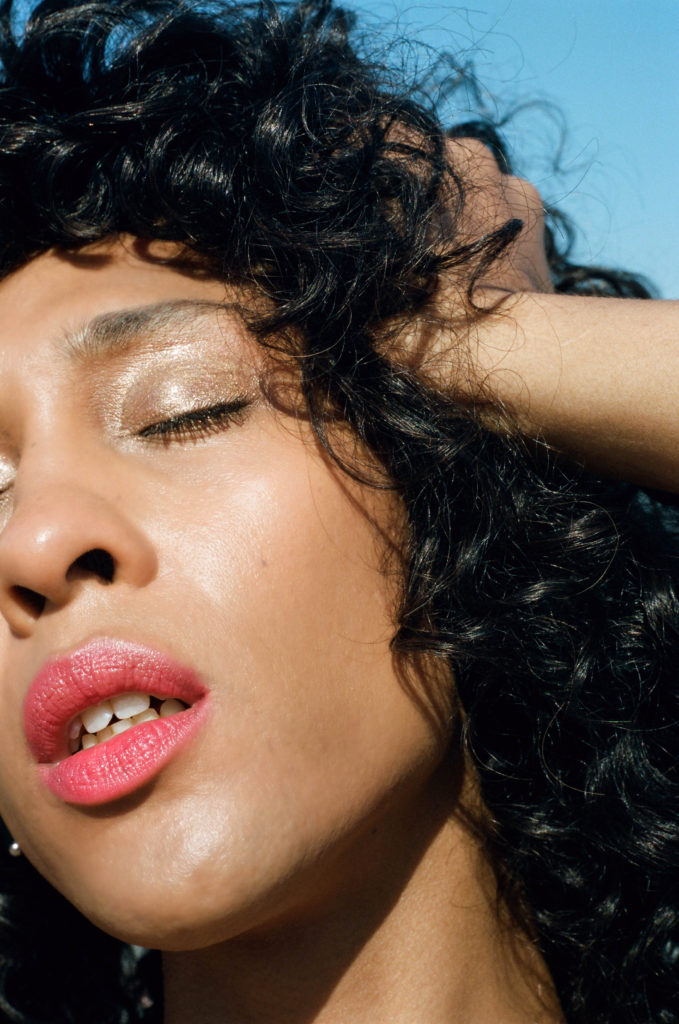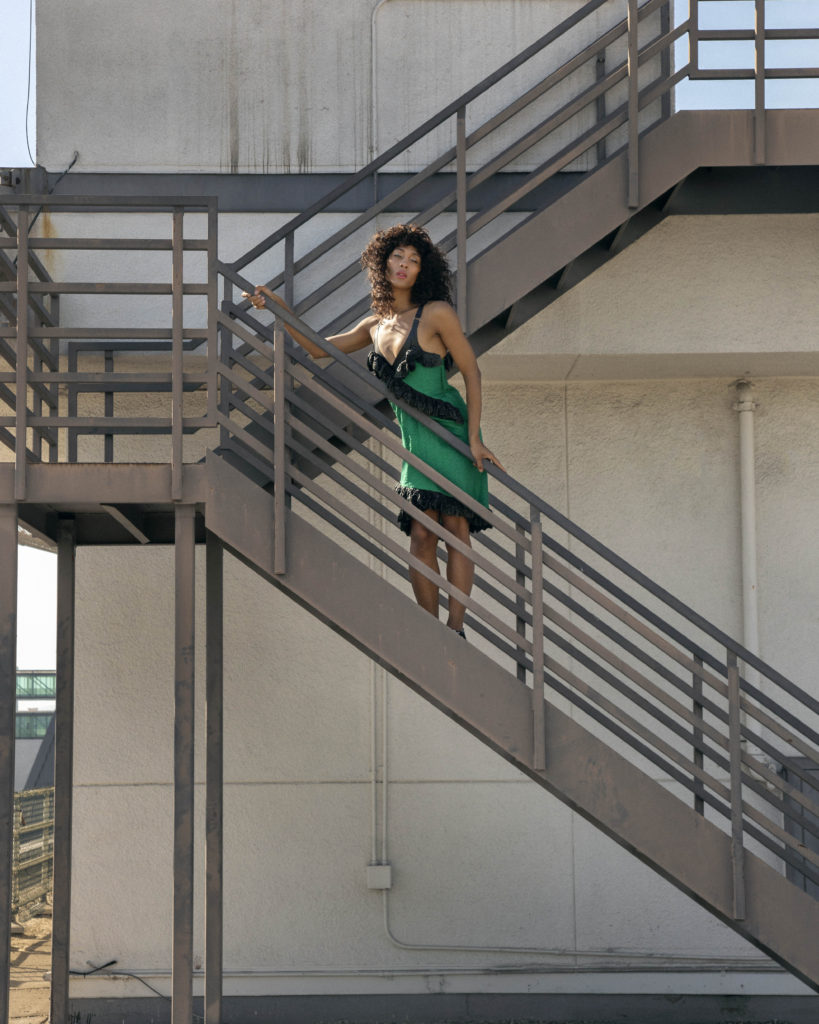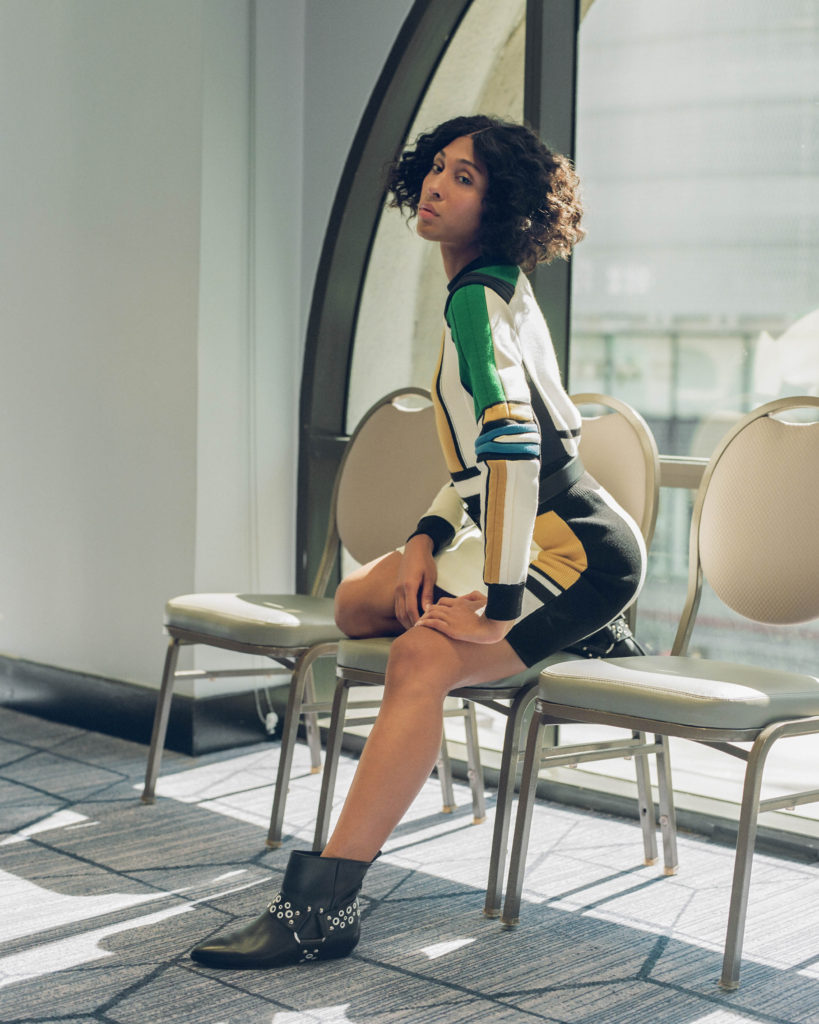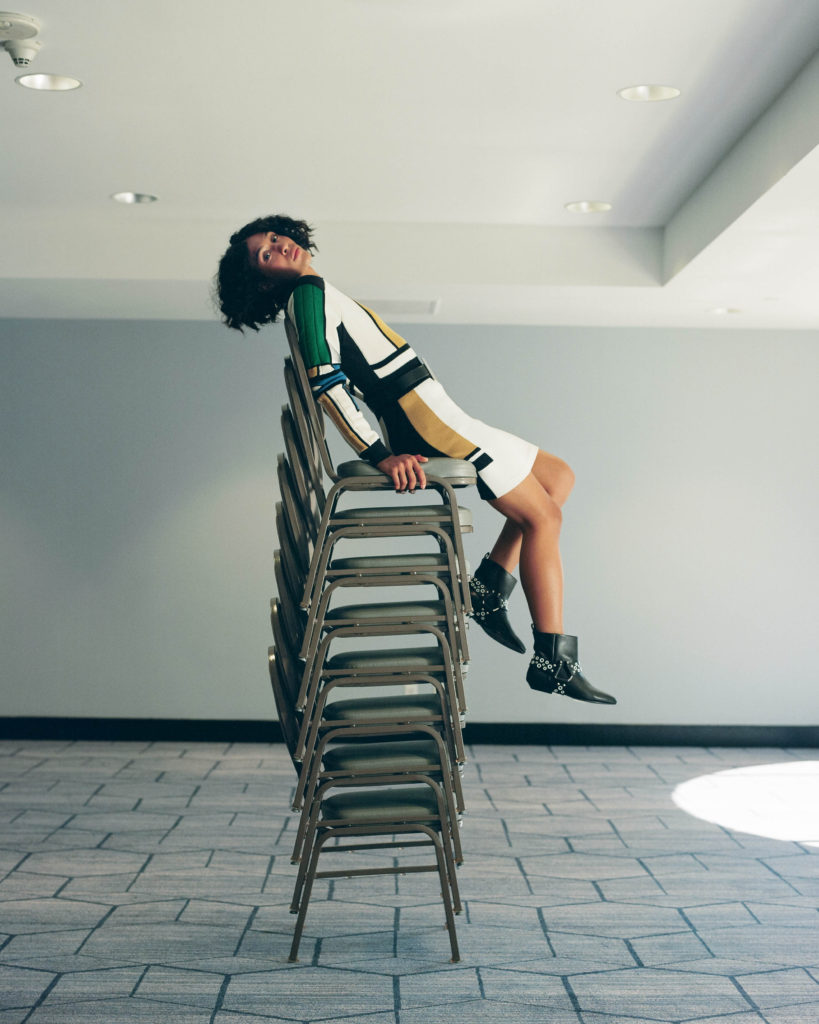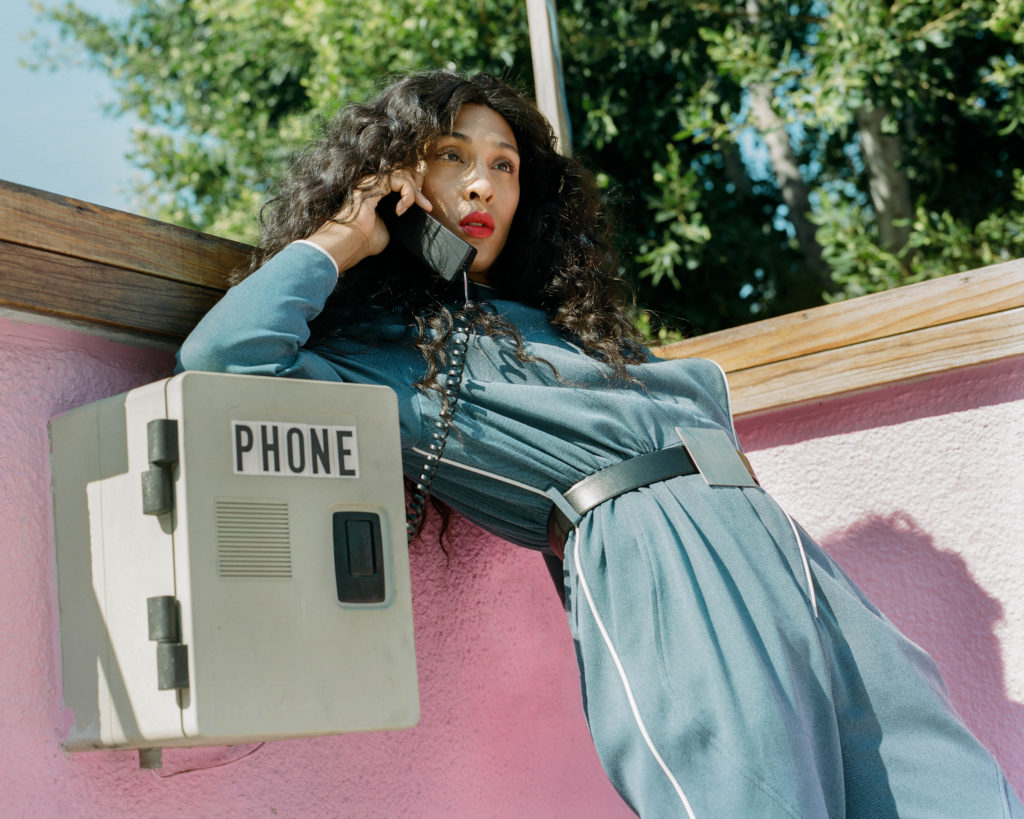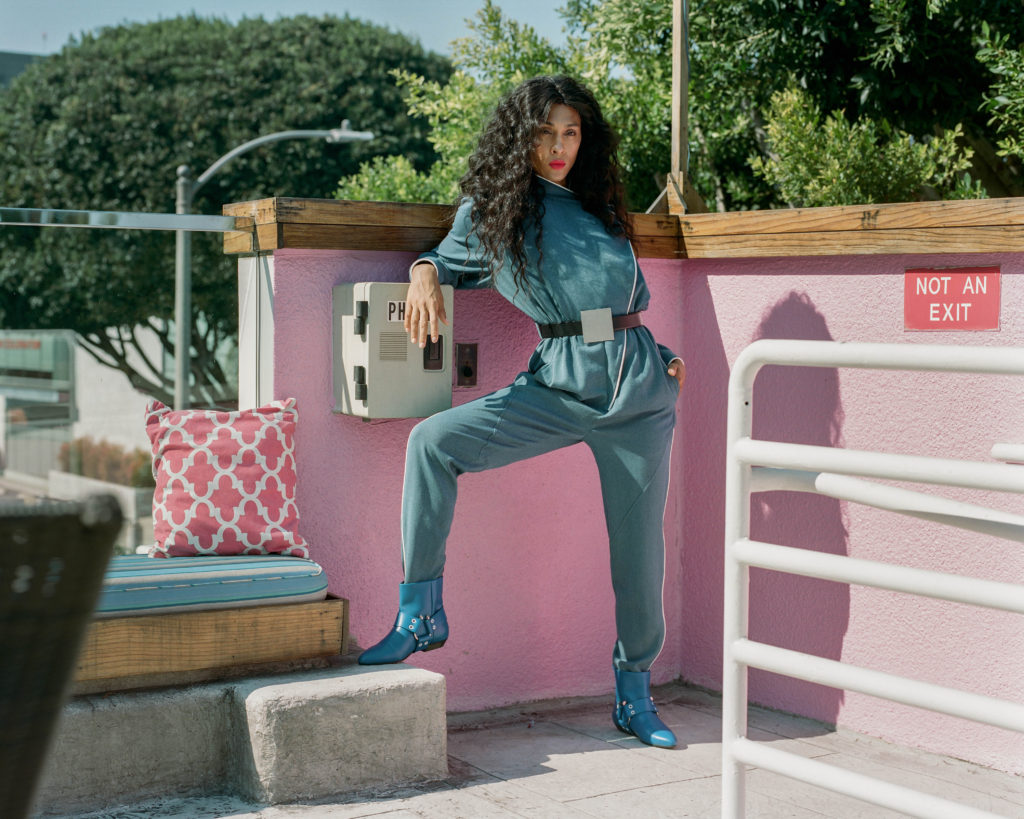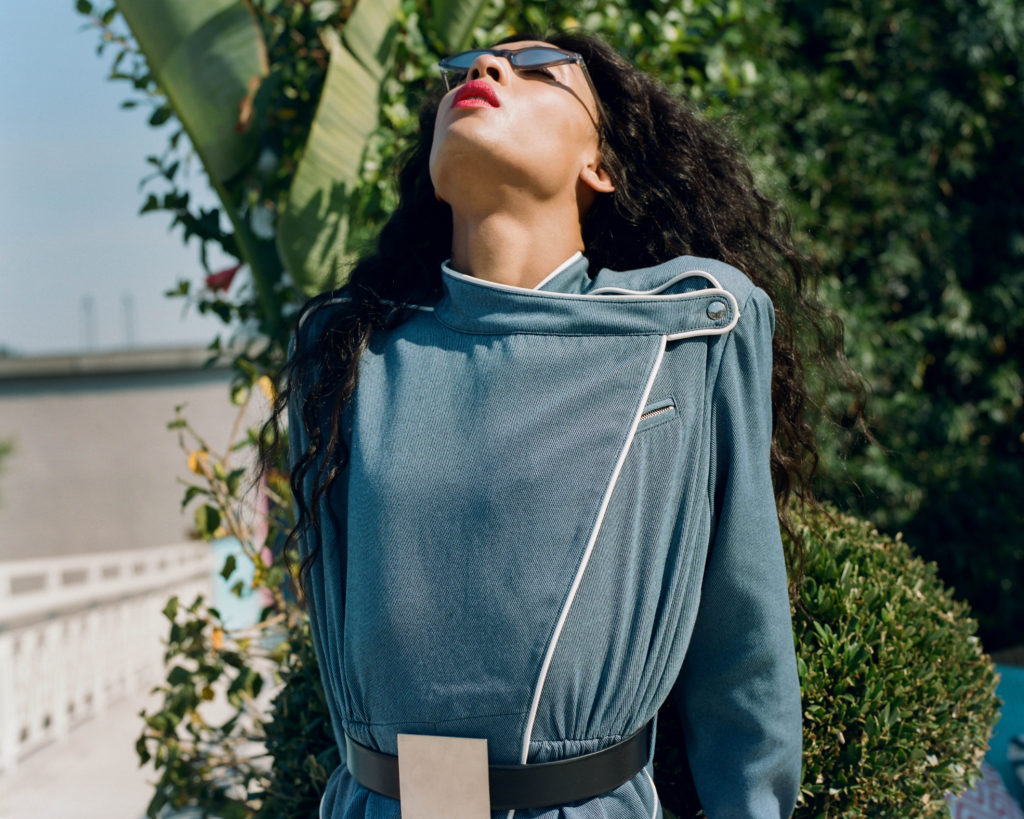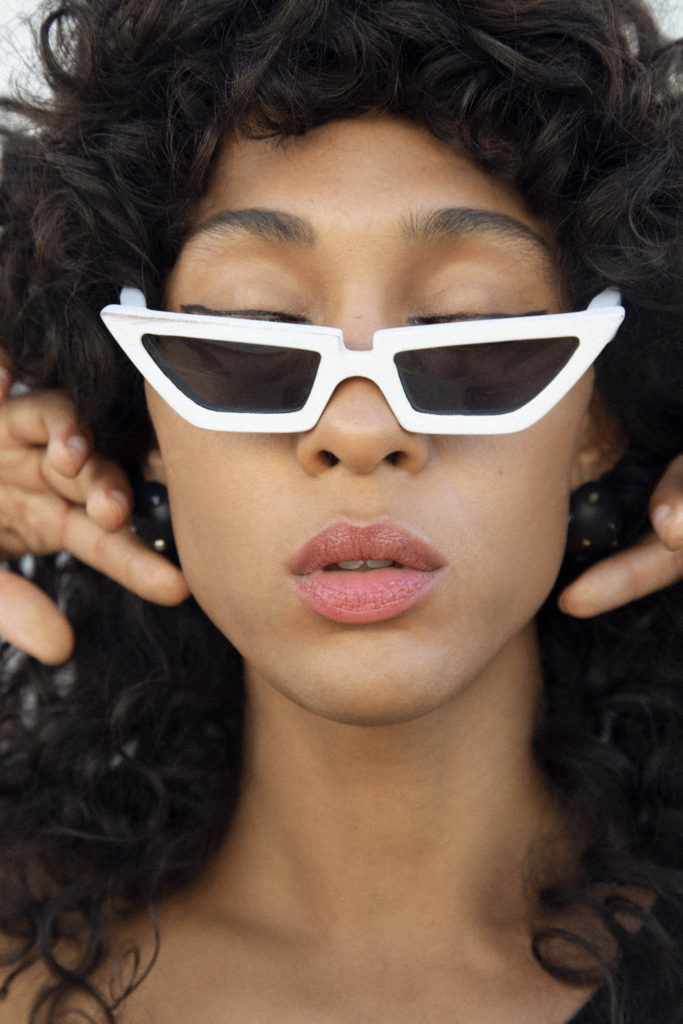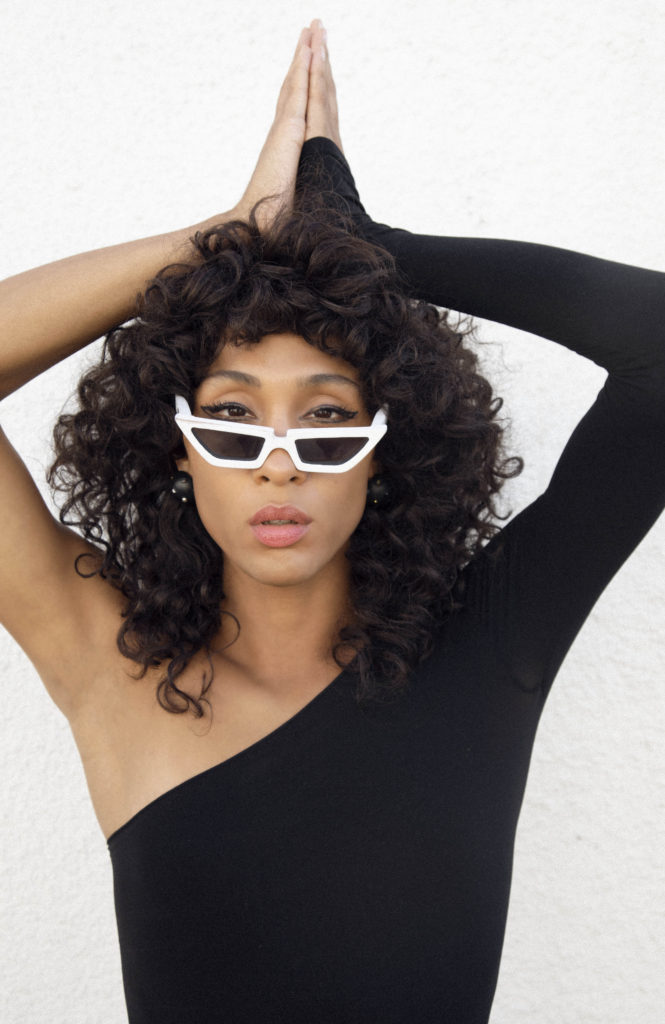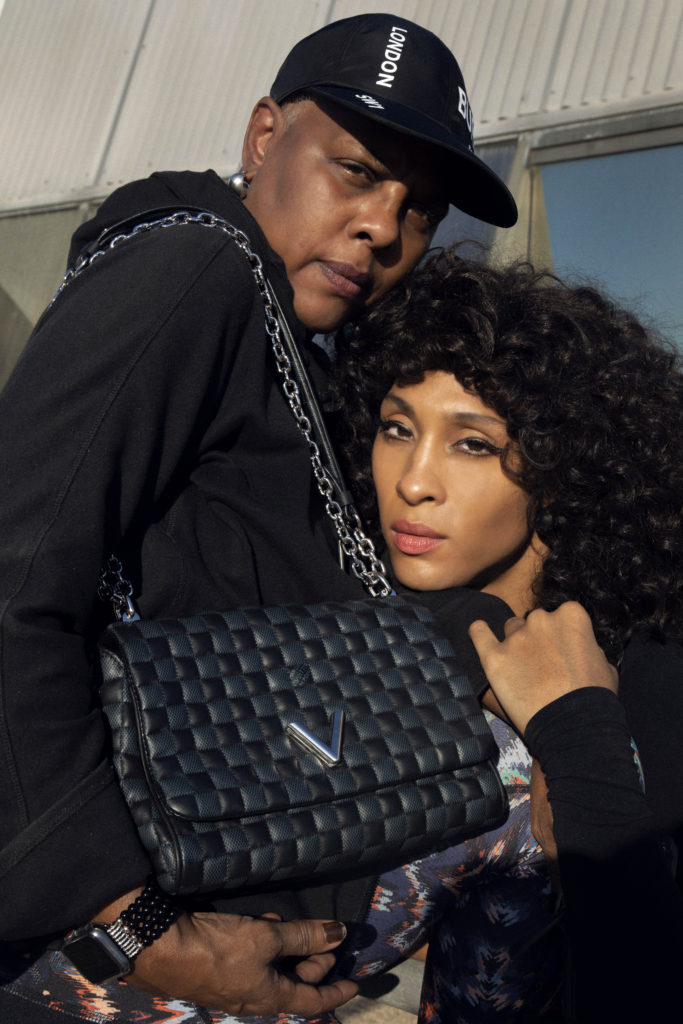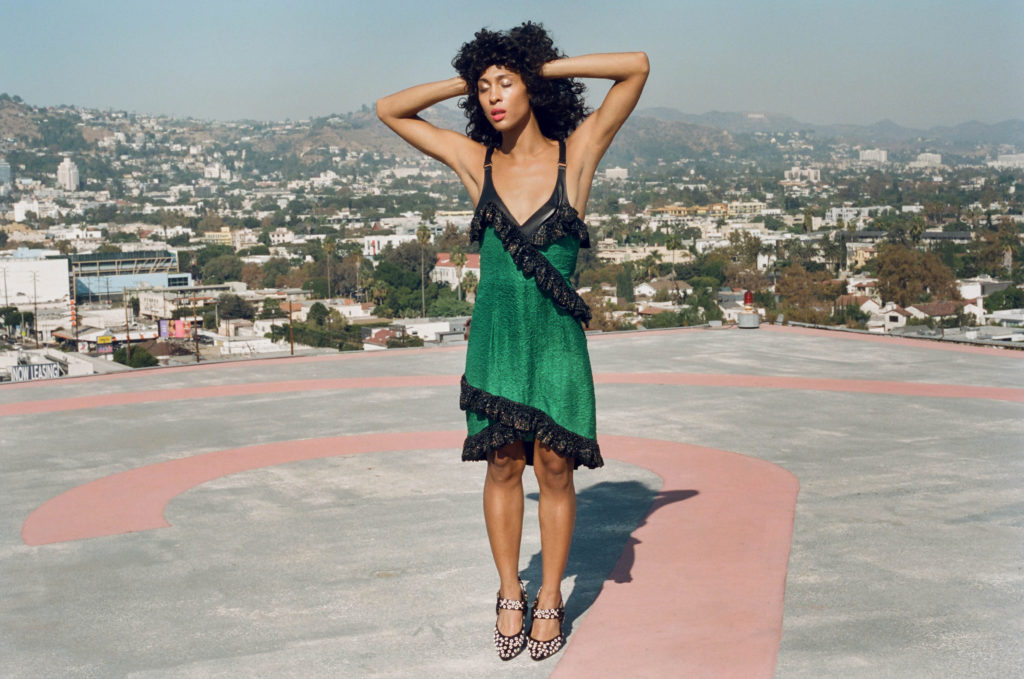
MJ Rodriguez
MJ Rodriguez is an American actress, singer and activist. The 28-year-old Newark, NJ native began her career at the age of eleven and gained notable recognition in 2011 when her portrayal of Angel in an Off Broadway production of “Rent” earned her the Clive Barnes Award. In 2017, she starred in Ryan Murphy’s FX series “Pose” as house mother Blanca Envangelista. The show was groundbreaking for transgender visibility and representation in television, garnering multiple nominations and awards during its first two seasons. Rodriguez is a trans and Latinx activist and is the recipient of many notable awards, including the Trailblazer Hispanic Heritage Award and Outfest Legacy Award.
Q: I grew up in a liberal and progressive family in the ‘70s, but Trans was still a dirty word – just the first syllable in psychiatric terminology like transvestite or transsexual, mysterious and spooky words that were thrown around mostly as insults. There was the joke of The Rocky Horror Picture Show, but not much else out there then. The term gender variant did not exist, I had no words for what I felt, but like you, I used to pray for God to change me. My prayer was for God to please make me a blue-eyed blonde pretty boy. That’s what I wanted to be, something my body was not even close to. In my books, storytelling created what I could not embody. They say some artists create what they need to see in art – that was what I did. When you were growing up, where did your sense of directive and drive come from? Did you have role models you looked to?
A: I didn’t grow up in the 70s, but I also grew up in a time where the terminology like “transvestite,” “transsexual” and even the word “tranny” was still used as derogatory terms towards us and were very insulting. I was in a place where I was finding my space in the world. I was also praying to God. I wasn’t praying for change, though. I was praying for clarity as I knew who I was. I was in the car with my father, and at the time, he didn’t know what I was praying about but I remember praying, Please make me a girl. I didn’t know at that time that I had completely and fully evolved into who I was, but I also had a very clear understanding of my identity.
I also had a strong head. I was a very persistent, adamant child and went against the grain. I rebelled a lot, not in bad ways, but I rebelled when people would go against me or use derogatory terms. My sense of directive and drive came from myself, but it also came from the people who raised me. We had our many moments, as any parent would go through with their kid, including with my identity, orientation and pronouns. At that time, I didn’t have the vernacular, nor did my parents or anyone else at that time when it was the 90s, to dive down and talk about things when it came to a young, trans kid. Instead, I just lived and existed like how I knew I was, but I would still assume the masculine traits that people would want to see me as. To be quite honest, no one even saw the masculinity at all. They saw the woman that I truly was, the girl that I was. They were like, “Girl, who are you fooling?”
As far as role models growing up, my mother was really my biggest role model. If we’re talking about people who were like myself, I didn’t really know any girls at that time when I was younger that were like me. When I was 14, I was involved in the ballroom scene, but I would go back and forth because I had my home to go back to. I wasn’t like some of the other kids who were displaced from their homes and who were blessed and raised by trans women who actually cared. But I also was very thankful for that, too, because I had my mom. I say this all the time, but I was never raised by trans women, and that’s not a bad thing at all. But a lot of young LGBTQIA individuals who have been displaced from their homes are [raised by trans women], and I didn’t have that. My chosen family came from my house father, so my role models were mainly my mom, and in small moments, in my years of being 14 to 17, my house father.
Then, looking on television and seeing shows like Will and Grace, where seeing gay characters being put in the forefront on mainstream television spoke to me. I truly didn’t identify as gay, but when the show Noah’s Arc came out, my television role models were in that show. Not only was there extreme black representation, there were sprinkles of trans sisters of color that were in that show. They had small parts, but they were still very prevalent and at the forefront. It was great to see that these women were leaders of the nightlife and of the shows. When I saw that, I thought, Oh my god, that’s me. I can tie this back to my mom, I can tie this back to my house father and the people that I really looked to. I really formed my confidence through these people. Those were my role models, and I’m really thankful for them. They have made me who I am today, especially my mother. One of the reasons why I speak about her so much is because she is truly the embodiment of Blanca. I take a lot of instances from her, as well as myself, and I put them in the show.
Q: For the LGBTQ organization Dot 429, I was on an anti-bullying panel with the phenomenal Janet Mock, who of course would make history as the first trans woman of color to be the writer, director and producer of a TV series: POSE, in which you play the role of Blanca Evangelista. Janet and I talked about our experiences with bullying. Was that ever an obstacle in your life? How did it impact you?
A: I was bullied when I was younger. I wasn’t bullied as much as other kids, which I was somewhat blessed with, but I did have extreme obstacles. Kids didn’t know how to converse with me because I was so eccentric. I was also very comfortable in who I was and daring. The kids didn’t know how to be in certain spaces with me, and therefore they would ostracize themselves from me. They would pick on me and call me “white girl,” call me specific names or say that I looked like I had AIDS. I was still hurt, and I thought to myself, Why would anyone want to inflict harm on someone who’s acting like a duck and letting water roll of its back simply and not follow suit? That didn’t make any sense to me. Why not happy with who you are? That doesn’t necessarily mean I’m tying that into the LGBTQIA community. I’m speaking for everybody. Why was it so hard for me to be accepted?
When I reached high school, those were the moments where I actually gained a lot of my voice due to what had happened to me in elementary school. I had a little bit of fight back at that time. I also had different reactions from younger males in high school. They saw me as this male figure (I guess that I can say male figure that even though I never saw myself as that), but they also saw that I had a lot of divine femininity. They saw that I was very comfortable in that. At seven, I knew I was a girl. At fourteen, coming into myself even more and still finding my voice, I knew that I was extremely different and that people didn’t know how to address that. It was mainly the boys, and they would address it with words of discouragement, words that were derogatory or they would inflict pain on me with violence. I remember being choked out in school by this one boy (God rest his soul). I didn’t know to consider him because he would be my friend at home, and he’d come over and we’d have so much fun together. At school, it would be a totally different story. I guess that’s one of the reasons why I’m a bit traumatized by men and how I interact with them. I’m trying to figure out what their motives are when it comes to a woman like myself, which is due to the experiences that I had when I was a young kid.
Yes, it’s impacted me a lot, but it also made me so much stronger. It made me the person that I am today. It also showed me that I was not the kid who would get bullied and then go behind themselves. I was the kid who got bulled and would walk in the next day, still be myself and dare anyone to try me again. I would always serve no matter what. It impacted me in a way in where I thought, I’m going to be who I am no matter what anyone says. That’s what carried me throughout my life as an adult.
Q: The video of your audition for Peggy in the Broadway show Hamilton really has this electric feeling. Part of it is simply the power and beauty of your voice, but there is also a sense that we are watching someone jump out of an airplane or take a high dive off a cliff – as if you are daring anyone to deny your power. There is an absolute resolute joyousness in how you perform. Auditioning for a cisgender role in a Broadway musical is the stuff of dreams. What was that audition like? Was it scary, or was it like a big green light from the universe, signaling that you were on the right track?
A: The audition for Peggy actually started out as a video on social media. I was finally not caring what people thought about me. This was the first time I put a video up where people saw me as who I was in physical form versus what they heard or heard me say when I mentioned my transition to them medically. I remember getting a call from a good colleague who worked at Telsey and Company. She called me in and said, “I see that you want to audition for Hamilton. I’m guessing it’s Peggy.” I said, “Yeah,” and she said, “Don’t worry, we’re giving you a call.” They gave me a call, and I thought, Oh my god. This is insane. I never thought they would consider me for this role. There was also a small piece of my mind that thought, Okay, they probably did because we’ve worked together since I was 18 years old. They casted me for Rent. My head was a little all over the place. I did feel like it was a big green light for inclusion and diversity of many different types of orientations, genders and racial backgrounds, because I’m a part of all of those marginalized groups. That was amazing, but it was also very scary because this was the first time that a lot of these people behind the audition table had seen me in physical form and had seen the true me. I was ecstatic, but I was also very nervous for what they would say or how they would perceive me. It just so happened that it went really well, and I got a final call back.
It also changed the narrative a bit within the Broadway world when they posted that article on Playbill. It was all of those things, but more than anything, it was gratifying and it was solidifying. It showed me that even within the musical theater realm, they were taking my craft seriously. They weren’t pinpointing me as the trans woman who came in for this role, but they were seeing a girl who loves what she does as an actress came in for this role to deliver the work. That just made my heart sing.
Q: Your character Blanca Evangelista uses her HIV diagnosis to be a mentor and create a house where others can flourish. What is the hardest part of playing that role for you?
A: I think the hardest part when it came to the HIV diagnosis was that the stigma of HIV still lives on and knowing how much bigger the stigma was back in the 80s and the 90s. Not only were people that contracted the virus being deemed as unworthy and treated as leapers, but the narrative and stories of young African American and Latinx individuals were not put in the forefront. It was hard for me to see that and dive into the character that way. It made me very emotional. That’s one of the hardest parts to me, because I know that there were many stories that were lost due to the virus itself and the stigma of it all. I was very hurt by those moments, and I used it Blanca and made sure it was done the right way.
Q: Actors, especially on television, find that people are often confusing them with the characters they portray. How would you describe your similarities and your differences with Blanca?
A: There are a lot of similarities that I’ve noticed between me and Blanca. I would also say as an actress portraying a character that is a splay of many people that have lived before me, me and Blanca are very different individuals. Blanca is a little bit more risk-taking being that she’s in 1987. She did a little bit more risk-taking when it came to her life and her survival tactics. I also noticed that there were a lot of women in the trans community taking risks simply because they were surviving. In my circumstances, I had to survive, but it was nothing compared to those women back in the day in 1987 through 1990. Blanca and I are very different when it comes to our walks of life and how we move through the world, but as far as our personality and character traits, I’m very nurturing, caring, loving and I love to make sure that people are okay. I thought that was one of the best parts of me to contribute to Blanca and for people to see just a hint of MJ through her. We have a lot of similarities and differences. I think a lot of people think I am Blanca, and sometimes I have to reiterate that, “No y’all, I’m MJ Rodriguez.” I’m not Blanca. I’m just a trans, beautiful woman that’s on the screen.
Q: You have spoken about getting married and having children, and we’ve seen our culture move in its acceptance of gay and lesbian married couples. What do you see as the biggest obstacles against trans acceptance?
A: The biggest obstacle against trans women are the connection between their male or female counterparts, especially with trans women who are hetero and are attracted to men. Men within that sector, heterosexual men, are very afraid or scared to date us. It’s getting better now because a lot of them are becoming a more understanding of our walk of life and seeing that we are really no different from any other women that walk on this earth. There’s a lot of pushing forward, but I think the biggest obstacle is men understanding us and loving us out and openly. If they are labeled within the LGBT community, there’s nothing wrong with that either. As far as marriage, having children and moving forward, I think men need to understand that that happens in all parts of any type of community, whether it be the LGBTQIA, black, Asian, or Caucasian community. It happens all around the world. I think there’s toxic masculinity that’s held over their heads and holds them back from being open. I think that’s the biggest obstacle when it comes to trans acceptance. As you may know, the pool for us is not that big when it comes to men because of the stigma that is held over our heads and how we’re shunned.
I don’t think there’s a big obstacle [when it comes to having children]. I see a lot of trans women in this world now that have children, but this is obviously due to successful relationships, which are very rare. There’s usually beautiful and successful outcomes. However, I can’t speak for all women.
Q: You have said you knew you were a girl when you were 7, and that you had faith your parents would know this too. Your mom was very supportive during your transition. Can you describe what role that kind of support plays in your ability to advocate for trans youth?
A: She played a huge role in that. Now that I’m a woman who’s older now, I’ve grown through the years and I’ve instilled a lot of nurturing and caring. When I go to a summit or a panel and I see young trans youth, I try to speak to the parents and tell them to be open to understanding their child before they shun them away. Ask questions just like your child would ask you, and you’ll see that the relationship will grow beyond what you think it could ever be. My mother always told me that she never came with a handbook, but that also came with her being knowledgeable enough to seek out the information through her child and see what her child wanted, what her child like, who her child was and how her child was going to move through this world. That happens with every person around the world, so that’s what I try to instill in a lot of the parents, so that they can be understanding of the young trans youth that are out there.
When I talk to the trans youth, I make sure that they take twenty minutes for themselves and look in the mirror and let themselves know that they’re worthy. This goes for all youth, but obviously trans youth, that they know that they’re enough. There’s a lot of suicide that happens in this world, and it’s one thing that I want to alleviate. It happens a lot within the LGBTIA community, especially with trans youth because they feel like they’re not seen, they’re not heard or they’re not worth being here on this earth. My main focus is to let them know that they have a purpose. The reason for that is because your girl right here MJ Rodriguez is a living testament to it. She’s going to be there no matter what, and she’s going to supersede the expectations of anyone who is bigoted or anyone who has negative connotations about her. If I can do that, then you can do it. You’re the next generation, so it’s going to be even better for you, and your voices will be even more amplified. I try to advocate that to them, and usually, they’re very receptive. I’m very happy they’re receiving it the way they are.
Q: I was asking you about your role models before. Now you’re appearing on television, keeping close contact with your fans, making yourself available for Q&A’s like this – do you feel that you’ve become a role model yourself? Is that something you can embrace, or does it ever feel like a burden?
A: I’m somebody who rolls with the punches. If someone sees me as a role model, dope. If someone doesn’t see me as a role model, dope. I see myself as MJ Rodriguez, who’s on the earth for a purpose: to be a good, living human being to all. If that is the definition of role model, then work. If there are some things that people don’t deem worthy, then I don’t care because that’s not the kind of “role model” that I’m trying to portray. I’m trying to be MJ first for herself, and I’m doing it in the most positive way. Hopefully, if people see that, then they’ll take what they need and move forward. I don’t feel that it’s a burden, but I do feel that it is a big responsibility, which I have no problem with. I’ve had a lot of responsibilities in my life, and one of them being that rebellious kid. I think that was the best part of me. I’m a girl from Newark, New Jersey who is comfortable in her urban-ness, comfortable in her blackness and who is comfortable with letting people know how it is and also knowing how to conduct a conversation when it needs to be done. If that’s your role model, then work. It doesn’t bother me either way.
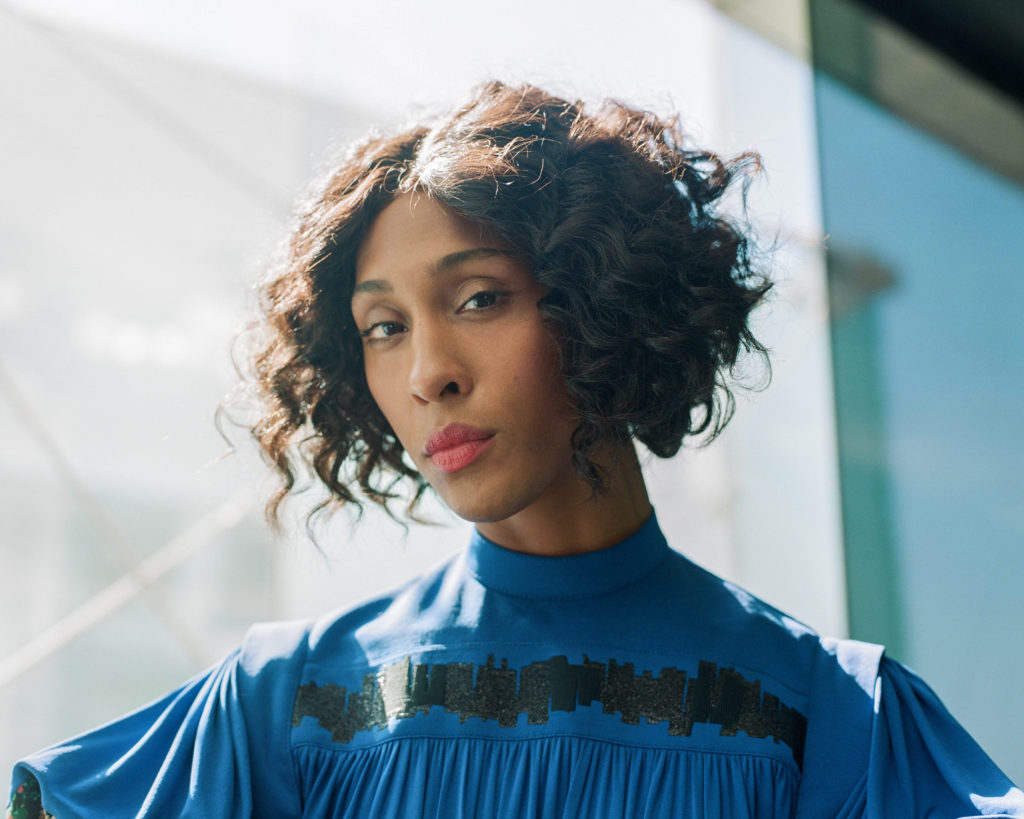
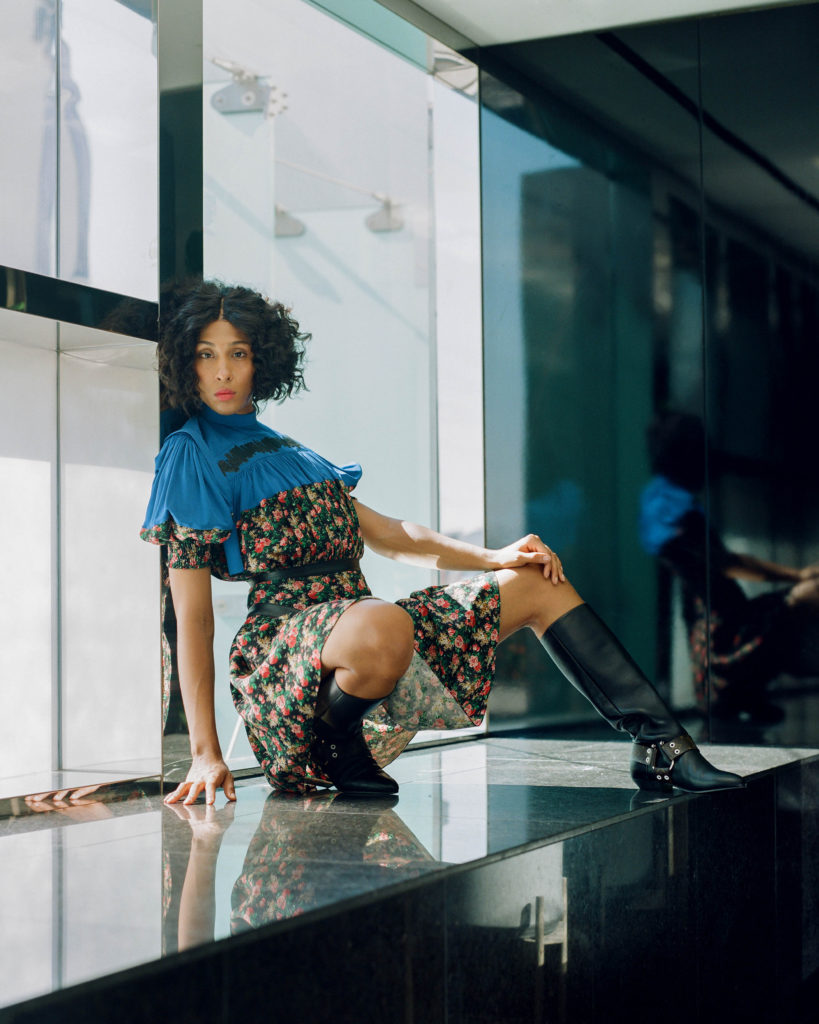
Q: Have you considered telling your own story in a book or movie?
A: Ooh girl! I would love for my story to be in a book or a movie! Do you hear me?! That would be so cute (laughs). I think it would be best if it was a book first, because I feel books are a bit more detailed and you get to dive down the rabbit hole as much as you can. I have considered that. It hasn’t started yet, but I’m sure down the line it will happen. I think I’m very young right now, and I feel like there’s much more life to live first and many more stories to tell for myself. When that time comes, then the book will happen. Then maybe after the book, a movie will happen.
Q: Today, a young person who comes out as trans or gender variant has resources available to them, most of which did not exist back in the ‘80s, when POSE takes place. Do people – young or old – confide to you about their inner desires to transition? What would you tell an older person who dreams of transitioning?
A: Believe it or not, I’ve only had a couple of those instances. I thought that I would have more where people would come to me and say, “Hey MJ, I’ve been thinking about transitioning and I just don’t know what to do.” I’ve had a couple of instances from individuals on Instagram who hit me up in DMs. When I say a couple, it’s like 15, which is a lot of people. But I get a lot of messages through Instagram and through people, and most of the time, it’s a lot of love and gratitude for the show. I’ve had a couple who have confided in me but not a lot. It’s beautiful either way, and it’s easy for me to express and talk about it because obviously I’ve been someone who’s gone through that.
For an older person considering transitioning, I would say that the research is most important. Knowing that this is something that you want to do and knowing who you are is the most important thing. I’m saying this because you said older person. Usually someone who’s trans, they know most of the time when they’re younger. Some older individuals come into it later on, because they didn’t have the outlet or the resources and due to their generation, they hold on. For the most part, I would say don’t make it completely and fully about the transition. Everyone transitions in their life. Do what you have to do for you as a person to make yourself the best person you can be. Don’t make it completely about the transition, because once you do, you’ll hinder yourself a bit when it comes to actually living life. Your whole life will become about the transition, and it shouldn’t be about that. Your transition is just a small but beautiful part of you, and there are many wonderful ornaments to your life. This is just an ornament that is added onto the tree that is already there.
Note: This interview has been transcribed and has been edited for length and clarity.

